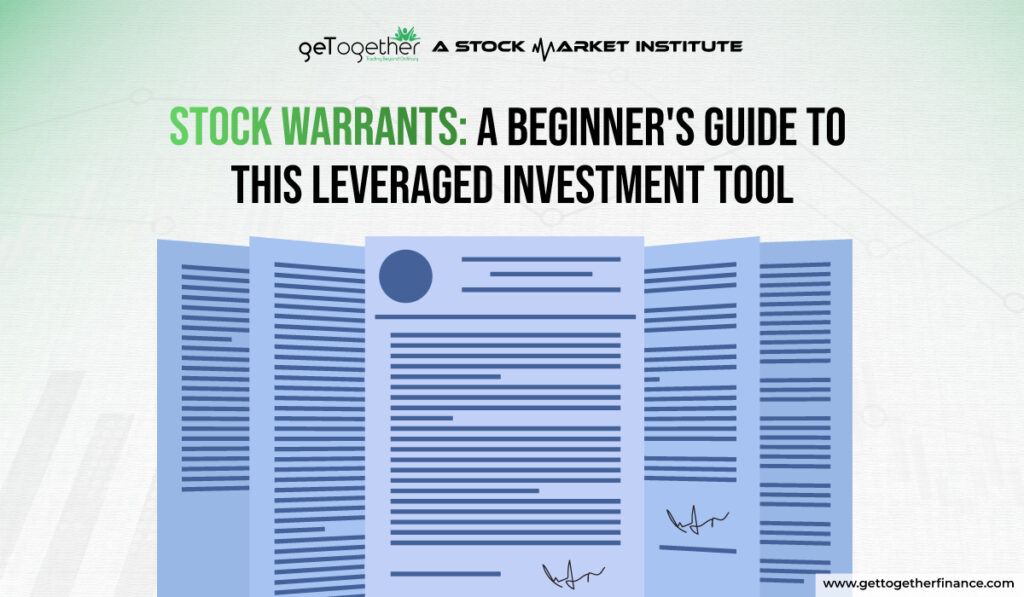Stock Warrants: A Beginner’s Guide to This Leveraged Investment Tool


Overview
In the investment world, there is a wide array of options, each with its own unique characteristics and risk-reward profile.
But have you ever stumbled upon “stock warrants” while researching investment options and felt a tinge of confusion? Among these, stock warrants are a type of option that holds the potential for amplified returns while also carrying a layer of complexity.
This blog is a one-stop guide that explains the basics of stock warrants, types, benefits and limitations in detail to give you comprehensive information before jumping into its investment world.
What are Stock Warrants?

Stock warrants are a type of financial instrument that grants the holder the contractual right, but not the obligation, to buy and sell a specific number of shares of a company’s common stock at a predetermined price (called the strike price) within a certain timeframe (called the expiry date). It works like options but instead of indices, it focuses on the specific stock’s movement of price. Warrants have a limited lifespan. If you don’t exercise your right to buy the stock by the expiry date, the warrant becomes worthless.
The exact origin of stock warrants is unclear, but their use can be traced back to at least the 16th century. They were initially employed by companies as a way to raise additional capital for financing ventures. In exchange for investing in the company, the investor received both a bond (providing a fixed income) and a warrant (offering the potential for future capital appreciation through stock ownership).
Over time, stock warrants evolved into a more standardised financial instrument. Today, they are often issued alongside other securities, such as bonds or convertible debt, to incentivize investors and add sweetness to the deal. They can also be issued independently by companies seeking to raise capital without diluting existing ownership through additional stock issuance.
Types of Warrants – Call and Put Warrants

Stock warrants, as we’ve established, offer the right to buy or sell a company’s stock at a specific price by a certain date. But within this framework, there are two main types of warrants, each catering to different investment strategies:
Call Warrants
Call warrants grant the holder the right, but not the obligation, to buy a specific number of shares of a company’s common stock at a predetermined strike price by the expiry date.
Investors who hold call warrants are essentially bullish on the underlying stock. They believe the stock price will rise above the strike price before the expiry date, allowing them to exercise the warrant and purchase the stock at a lower price than the current market price. This potential for magnified profits compared to directly buying the stock is the primary appeal of call warrants.
Put Warrants
Put warrants grant the holder the right, but not the obligation, to sell a specific number of shares of a company’s common stock at a predetermined strike price by the expiry date.
Investors who hold put warrants are typically bearish on the underlying stock or want to hedge their existing holdings. They believe the stock price will decline before the expiry date, allowing them to sell the stock (through the put warrant) at a higher price than the market price, locking in a profit.
Also Read: Hedging
Why are Stock Warrants Issued?

Stock warrants, while offering investors the right to buy or sell a company’s stock at a specific price, also play a strategic role for the issuing companies themselves. Here’s a deeper dive into the key reasons companies choose to issue stock warrants:
Raise Capital without Dilution: Warrants don’t dilute ownership immediately like issuing new shares, allowing companies to raise capital without impacting existing shareholders’ control.
Incentivize Investors: Attaching warrants to bonds (like sweeteners) makes them more appealing, attracting investors and providing companies with needed capital.
Signal Confidence: Issuing call warrants suggests the company believes the stock price will rise above the strike price, boosting investor sentiment and potentially attracting new investment.
Generate Additional Income: Selling warrants directly can be an additional revenue stream for the company.
Enhance Liquidity: Warrants traded on a secondary market increase the overall liquidity of the company’s stock, potentially attracting more investors.
Companies may also use warrants strategically, for example, as employee stock options or in mergers and acquisitions.
Advantages and Disadvantages of Stock Warrants

When it comes to benefits, stock warrants offer a unique investment opportunity with the potential for amplified returns. They provide leverage, allowing for larger profits if the stock price rises significantly above the strike price, all with a lower initial investment compared to buying the stock directly. Additionally, you have the flexibility to decide whether to exercise the warrant based on market conditions.
Here is a table that summarises the key benefits and limitations of stock warrants:
| Benefit | Description |
| Leverage | Potential for magnified returns |
| Lower Initial Investment | Requires less upfront capital |
| Flexibility | Choice to exercise based on market conditions |
However, this flexibility comes with limitations. Warrants suffer from time decay, their value steadily decreasing as they near expiry. They also carry the risk of becoming worthless if the stock price doesn’t reach the strike price by the expiry date.
Now let’s take a look at the some limitations that comes with stock warrants:
| Limitation | Description |
| Time Decay | Warrant value decreases over time |
| Risk of Loss | Warrant becomes worthless if it is not above your strike before expiry |
| Lower Liquidity | May be difficult to buy or sell at desired price |
Conclusion
Stock warrants are one of the fascinating financial instruments that offers a unique blend of inherent risks and potential rewards. However, what most investors overlook is the threat of time decay and the possibility of complete loss if not exercised by the expiry date demands a cautious approach. It is crucial to know that before you enter into the world of stock warrants, you need to conduct in-depth technical and fundamental research to decode the intricacies involved to carefully assess the underlying risks.
FAQs
Are Stock Warrants Popular?
Most commonly stock warrants are exchanged in the U.S., but not popular among traders. Despite the U.S. It is also traded in other markets such as Hong Kong, China, and Germany.
Why Would a Company Issue Stock Warrants?
Companies use stock warrants for a few key reasons. They can raise capital without immediately diluting existing shareholders’ ownership stake. Besides, call warrants give traders confidence in future growth, selling warrants potentially help with extra income and enhance the overall liquidity of the company’s stock.
How Can You Find Information on Stock Warrants?
There are multiple ways to research stock warrants. Public company filings disclose details about their warrants, including strike price, expiry date, and number of shares offered. Reputable financial websites often provide quotes, news, and analysis on stock warrants. Consulting with your investment broker can also be helpful, as they can offer insights on specific warrants and explain the potential risks and rewards.
What are the taxes on stock warrants applied in India?
Stock warrants are taxed in India based on the type of transaction. If you exercise a stock warrant by purchasing the underlying stock, any profit or gain is taxed as capital gains. The holding period determines whether it’s short-term capital gains (if held for less than 3 years) or long-term capital gains (if held for more than 3 years), each with its own tax rate. However, if you sell the warrant itself without exercising it, any profit is considered a capital gain and taxed accordingly.



 Facebook
Facebook  Instagram
Instagram  Youtube
Youtube 
